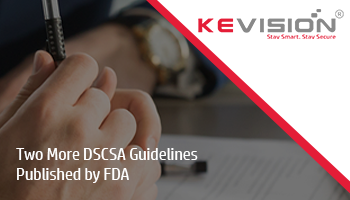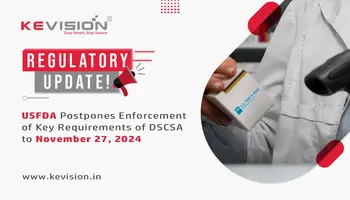
Two More DSCSA Guidelines Published by FDA

Drug Supply Chain Security Act (DSCSA) was first enacted in 2013 by the US Food and Drug Administration (FDA) to boost the ability to increase patient safety. DSCSA outlines the necessary steps to build an electronic, interoperable system to identify and trace prescription drugs through the supply chain to eliminate drug counterfeiting. This enabled the government to identify any stolen, diverted, or counterfeit medicine and remove it from the market before the patients consumed it. Also, it is made sure that drugs and medicines subject to DSCSA are safely stored and transported to avoid any entry of harmful products.
Recently, on 5th July, the FDA issued two different draft guidelines and announced that “these documents are critical steps toward implementing the DSCSA enhanced drug distribution security requirements that will go into effect on November 27, 2023.”
The first one “DSCSA Standards for the Interoperable Exchange of Information for Tracing of Certain Human, Finished, Prescription Drugs” describes the use of electronic standards for tracing products throughout the pharmaceutical supply chain. It is an update of the version issued in 2014. The guidance suggests changes including a restriction on paper-based tracing of medicines and verification of products at the package level will be required unless a waiver, exception, or exemption applies.
To provide and maintain the data associated with the transaction information and transaction statements, the FDA strongly recommends trading partners use the Electronic Product Code Information Services (EPCIS) standard. EPCIS is a global GS1 standard that allows trading partners to capture and share information about products as they are transacted through the supply chain. FDA firmly believes that EPCIS is an appropriate globally recognized standard and there is considerable agreement amongst the stakeholders.
The second one “Identifying Trading Partners Under the Drug Supply Chain Security Act” will help industry, state, and local governments categorize the entities in the drug supply chain in accordance with the DSCSA. It is a revised version of the guidance issued in 2017. FDA announced that in the revised draft, it has added or revised its current thinking on the status of certain entities as trading partners, such as private label distributors, salvagers, returns processors, and reverse logistics providers.
The draft also includes clarification on how trading partners in the supply chain can be categorized. A clarification is also given on some drug distribution scenarios which include distribution for emergency medical use, office use, non-human research purposes, and research in humans under an investigational new drug application.
FDA also announced that until some rules are finalized and issued regarding the licensing standards for 3PL providers, these providers will be considered licensed trading partners if they are certified by the state.
Kevision Systems, part of the Kevin group, is a leading provider of complete solutions and services to protect your products and supplies. We are also a leading Solutions Provider for Vision-Based Inspection Systems for products, especially in the Healthcare, Food & Beverage as well as Automobile Industries. With Global Trade becoming seamless, the need for increased security & traceability of products is imperative for product authenticity. Kevision partners with clients to provide a robust & secure solution to meet product & client safety as well as regulatory compliance.
